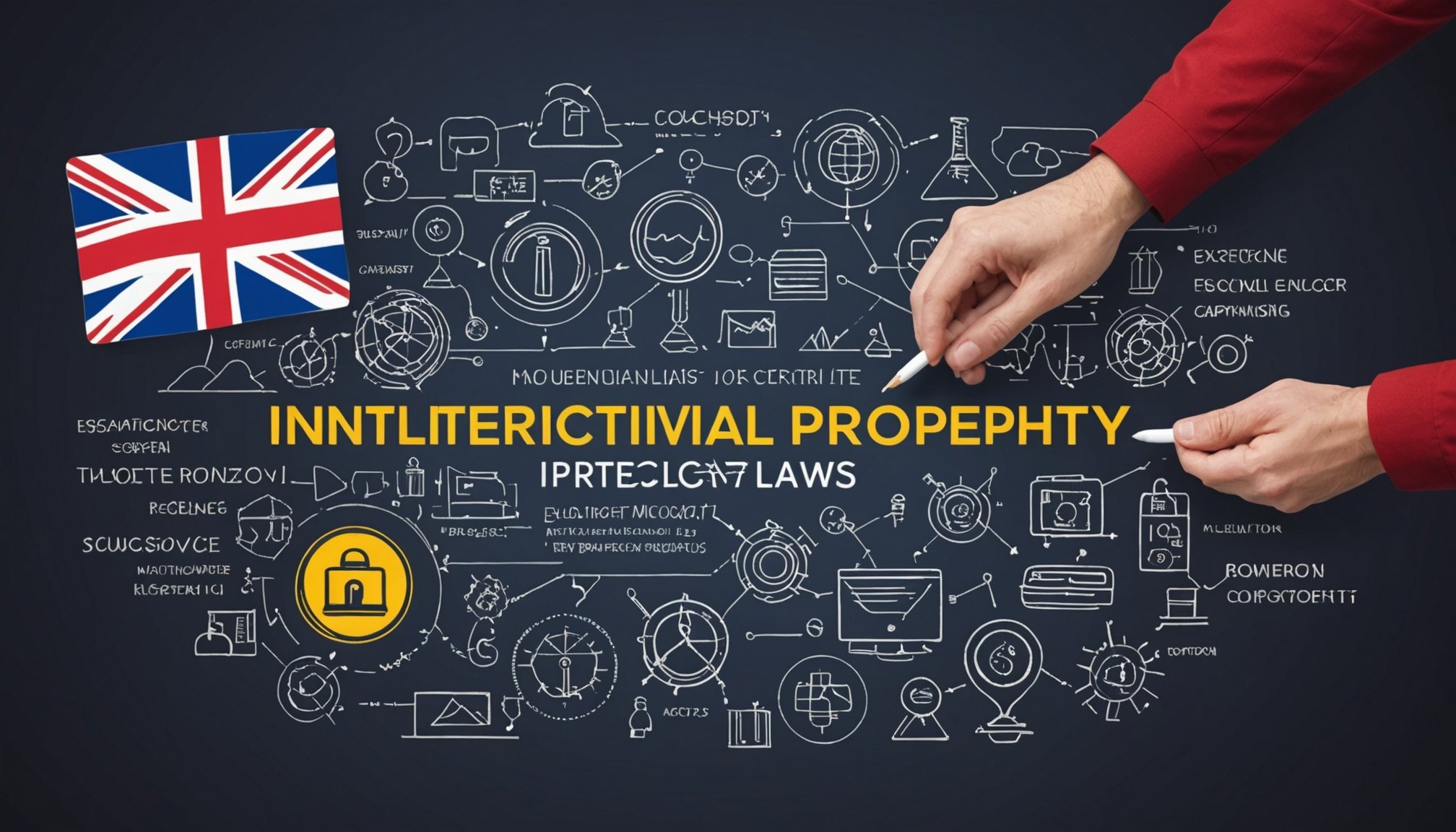Overview of UK Intellectual Property Laws
Intellectual property (IP) is crucial for startups, safeguarding innovations and unique ideas. The foundation of this protection lies in the UK’s robust legal framework. Understanding UK intellectual property laws is imperative for startups aiming to secure their creations and maintain a competitive edge.
UK intellectual property laws encompass several key areas, including patents, trademarks, and copyrights. These laws are designed to promote innovation and economic growth by providing exclusive rights to creators and inventors. Startups benefit immensely from this protection, as it prevents competitors from exploiting their original concepts without permission.
Also to see : Navigating uk import rules: essential strategies for starting your gourmet food business
The interplay between IP laws and innovation is significant. The prospect of securing legal protection encourages inventors to bring their ideas to the market, knowing that their efforts will not be directly copied or unfairly exploited. This sense of security fosters a more dynamic and inventive landscape.
For startups, understanding and navigating these laws is essential. Startup protections ensure that ideas are not just recognized, but are legally defended. By comprehending and leveraging the UK’s legal framework, startups can create a reliable shield for their intellectual property, driving them towards long-term success in an ever-competitive business environment.
Also to see : Navigating uk packaging waste regulations: the ultimate handbook for new consumer goods brands
Types of Intellectual Property
Understanding the different types of intellectual property (IP) is essential for any startup aiming to protect its innovations. In the UK, the primary categories include patents, trademarks, and copyrights. Each category offers distinct protections and advantages, tailored to safeguard various aspects of intellectual creativity.
Patents
Patents are crucial for protecting inventions and technological advancements. They provide exclusive rights to prevent others from making, using, or selling the patented invention. Startups must follow a detailed process to obtain a patent, which involves submitting an application to the UK Intellectual Property Office (UKIPO). Successful applications often result in significant benefits, as seen in startups involved in technological innovation, securing a competitive market edge.
Trademarks
Trademarks protect brand identity, distinguishing goods or services from competitors. For startups, this means safeguarding brand names, logos, or slogans. To register a trademark, follow steps outlined by the UKIPO, including conducting a trademark search and submitting an application. Startups like BrewDog have exemplified success by establishing strong trademarks, boosting brand recognition and loyalty.
Copyrights
Copyrights protect original creative expressions such as software, music, and written content. In the startup world, registering a copyright can help secure creative outputs. The registration process involves lodging the work with the UKIPO. Notable cases, such as those concerning software rights, underscore the importance of copyrights in defending intellectual creations.
Registration Processes
Efficient IP registration is vital for startups to secure their assets. Start by understanding the step-by-step guide for a patent application. A comprehensive search is essential to affirm the uniqueness of your invention before applying to the UK Intellectual Property Office (UKIPO). This involves submitting detailed descriptions and potentially undergoing examination phases.
Similarly, trademark registration requires strategising. Begin with conducting a trademark search to ensure no conflicts with existing brands. Following this, prepare and submit necessary documents like a clear representation of the mark for review. Remember that fees can vary depending on the complexity of the application.
For copyright registration, while not mandatory in the UK, formal registration lends stronger protection. Document your original work meticulously and submit it to the UKIPO for lodging. This formalises your claim with an official record, offering added legal leverage.
Understanding these processes is crucial, as an incomplete or incorrect application can lead to delays or rejection, hampering your business prospects. Plan thoroughly, delineate roles clearly among team members for distinct tasks, and consider professional legal advice when navigating these intricate frameworks to bolster your IP strategy confidently.
Common Pitfalls and Challenges
Navigating intellectual property can present significant startup challenges. It’s crucial for startups to be aware of potential IP pitfalls to avoid costly legal issues. A common mistake is neglecting thorough IP research. This can lead to unintentional infringement, resulting in litigation or the necessity to change business strategies, both of which are time-consuming and expensive.
Startups often underestimate the importance of a comprehensive IP strategy. Without it, they might fail to protect critical innovations adequately. For instance, not registering trademarks early can lead to brand confusion or exploitation by competitors.
Another frequent pitfall is inadequate documentation. Precise and detailed record-keeping of innovations and ideas is necessary to support IP claims. Lapses in this area can weaken legal standings in disputes.
Real-life examples abound where startups have faced legal issues due to IP mismanagement. Such as overlapping patents, where due diligence could have prevented significant setbacks. By learning from these examples and prioritising thorough research, startups can better safeguard their valued intellectual assets.
Additionally, engaging with legal professionals specialising in IP can provide valuable insights and help prevent these challenges, ensuring a smoother path to market success.
Best Practices for Safeguarding Innovations
The safeguarding of innovations is a critical concern for startups. Understanding IP best practices ensures that startups protect their intellectual assets effectively. A comprehensive IP strategy is the cornerstone of successful startup strategies. Startups must outline clear paths to secure their inventions and creative works.
Non-disclosure agreements (NDAs) play a pivotal role in protecting innovations by legally binding parties to confidentiality, deterring potential leaks or misuse of sensitive information. Implementing NDAs when discussing ideas with external parties is prudent.
To bolster long-term success, building a robust IP portfolio is essential. This involves diversifying IP assets across different types, such as patents, trademarks, and copyrights. A varied portfolio not only fortifies a startup’s market stance but also appeals to potential investors.
Moreover, continually reviewing and updating one’s IP strategy is vital. As startups grow, their IP needs may evolve, necessitating ongoing assessment and adjustment. Employing these practices helps startups safeguard their creative endeavors, providing a competitive edge in the marketplace. By investing in these protective measures, startups build a solid foundation for sustained growth and innovation.
Resources for Startups
Navigating the world of intellectual property (IP) can be daunting for startups. Thankfully, numerous IP resources provide essential support. For startups seeking legal support, the UK’s Intellectual Property Office (UKIPO) is invaluable. They offer guidance on protecting inventions and registering IP rights.
Several organizations focus specifically on assisting startups with IP challenges. Innovate UK provides funding and expert advice, while the British Library’s Business & IP Centre offers workshops and free resources. For a deeper dive, consider engaging with the Chartered Institute of Patent Attorneys (CIPA), as they connect startups with experienced attorneys.
Educational materials are crucial for budding entrepreneurs. Books such as “Intellectual Property: The Basics” by Elizabeth Russell can provide foundational knowledge. Online platforms, including Coursera and edX, offer courses on IP laws tailored for startups.
Networking is equally important. Attending events organized by IP-focused communities like the IP Inclusive group can result in valuable industry connections and insights. These gatherings offer opportunities to share experiences and strategies to safeguard innovation.
By leveraging these tools and communities, startups can better navigate the complex IP landscape. This equips them to protect their unique ideas and foster successful business ventures.







